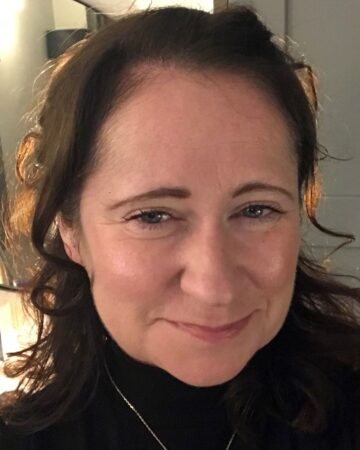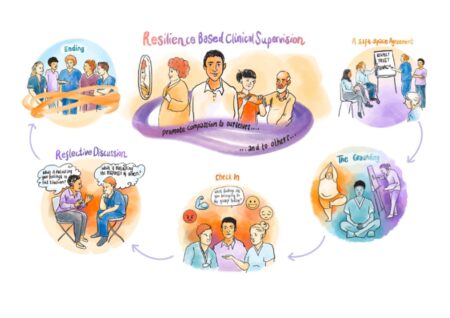Home News & Views I might get this wrong…
I might get this wrong…
 Talking about bias and racism when facilitating Resilience based clinical supervision (RBCS)
Talking about bias and racism when facilitating Resilience based clinical supervision (RBCS)
Sheila McGovern, FoNS Person-centred Practice Facilitator
In mid-May, a group of us RBCS facilitators came together for a share and learn session focused on a topic that we had identified as needing further exploration in a previous clinical supervision session: how we feel about and work with racism, diversity, and bias – both conscious and unconscious – when it shows up in our facilitation of RBCS.
In that session, some facilitators had shared feeling uncomfortable or unsure if they were the right person to raise issues like racism. Others felt anxious about getting it wrong. We all agreed it was important to make space to sit with this together and explore how we could do better.
I offered to write a blog about our conversation, and a colleague kindly took notes. But then… nothing happened. Well, not quite nothing. I thought about it, a lot. But those thoughts never became words on a page. The more I thought, the less I wanted to open my laptop. Instead, I ruminated, worrying about all the ways I could get it wrong.
And then I realised – I was doing exactly what we’d talked about in that session. Avoiding the issue. Just like so many of us do when it comes to racism, bias, and diversity.
The Brap report “Too Hot to Handle” argues that there is a “culture of avoidance, defensiveness, and minimization of racism within NHS trusts”. If you haven’t read the report, I recommend you do.
And here I was, falling at the first fence of avoidance.
Now, I’ve started. And I realise I might get this wrong. But I believe as we discussed in our conversation in that session, that it is better to get this wrong than to not talk about it at all. If we get it wrong, we can say sorry and ask how we can get it right. How can we make it better, easier, for our colleagues, our fellow nurses and healthcare workers that are of different backgrounds, races and ethnicities to feel empowered to speak up about racism and discrimination if we are too worried about getting it wrong?
 When facilitating Resilience-based Clinical Supervision, we spend valuable time creating a safe space agreement. We talk about the importance of psychological safety and creating a safe space for sharing and learning. This is pivotal to the process of RBCS and is embarked upon as one of the first parts of the process.
When facilitating Resilience-based Clinical Supervision, we spend valuable time creating a safe space agreement. We talk about the importance of psychological safety and creating a safe space for sharing and learning. This is pivotal to the process of RBCS and is embarked upon as one of the first parts of the process.
I have learned in my time facilitating the RBCS facilitator programme that this is the best first-stage to open up the conversation about differences and let the participants know that this is a space where we can have conversations about racism and biases.
In the Brap report referenced above, one of the recommendations is that we develop an appetite for ‘race talk’. Doing this – creating spaces where we can talk openly about race – especially the subtle, everyday forms of racism – helps people recognise that racism isn’t rare or isolated. It also builds our confidence to have these conversations with less fear and more understanding of each other’s experiences, and helps create conditions where people feel heard, believed, and supported when they speak up about their experiences of racism or discrimination.
If we co-create these conditions, while establishing our safe space agreement at the beginning of the programme, there will be less discomfort and more openness to the race/bias conversation coming up elsewhere in the process and especially in the reflective discussion.
I have shared the Brap report with participants after discussions around racism and biases and I am still surprised at how many people are still unaware of its existence.
In our share and learn session we discussed how we often feel pressure (often self-directed) to “get it right” or fix issues without making mistakes and that this in turn leads to fear and avoidance but we also know as facilitators of clinical supervision that growth often requires discomfort. Safe spaces require bravery, not comfort, especially from the facilitator. We need to be ok with acknowledging race and all differences, as real, valuable, and worthy of conversation so that the people we are working with feel this too. We need to role model how it is ok to get things wrong. How to say sorry, tell me how I can get it right, how can I do better?
That said, if we undertake facilitation thinking we must do things perfectly, we are missing the point. I often think as nurses we muddle up the words professionalism and perfectionism or that may be just something I have done. But I am learning. It is only in the mistakes and the getting it wrong that we can learn and grow and when we demonstrate this to others, we are also providing them with the conditions to grow as individuals.
One of the underpinning theories of RBCS is Compassion Focused Therapy. We mustn’t forget how important the role compassion, care and kindness have in these conversations to each other and ourselves. Paul Gilbert talks about compassion being “…about confronting the reality of life and death with wisdom and taking beneficial action.”
More than kindness: compassion and its uses – ABC listen
RBCS offers us supportive ways of relating to our inner critic. It can often be that critical voice that brings the fear of getting it wrong. If we can identify when that starts to happen, and it usually shows up with a feeling that we will recognise, we can bring compassion to ourselves and stay in the moment with a willingness to listen and really hear and learn from other’s experiences. This is when we can start to take beneficial action. The more conversations we have, the more questions we ask, the more chance we have of shining a light on prejudices, biases and racism and there is hope that we can all do better.
It was so important to start this discussion as a group of facilitators. We know that it is just the beginning and that it is important to keep talking and we have committed to do that. We have added to our own safe space agreement regarding making assumptions and understanding judgements.
Avoidance doesn’t move us forward; in fact, it often leads to further harm. When we turn our heads away, we are not being present to the harm and thus perpetuating the belief that this doesn’t matter.
Let’s keep learning together. I’d love to hear how you navigate these conversations in your own work. What helps you speak up, even when you’re worried about getting it wrong?
Comments are closed.

